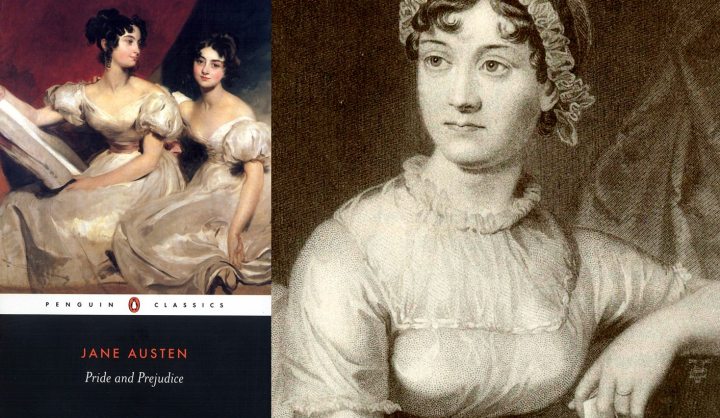Maverick Life
On the shelf: Why Pride and Prejudice speaks volumes 200 years later

Monday marks the 200th anniversary of the publication of Jane Austen’s most celebrated novel, Pride and Prejudice. KHADIJA PATEL delved beneath the covers to discover the enduring appeal of the novel.
There comes a time – as a twenty-something, unmarried Indian woman – when you can attend weddings quite undisturbed by old women enquiring insistently when they may expect to be gracing your wedding. You’re left alone to eat your biryani in peace. There are younger women, unsullied by age and difficult-to-describe jobs, to point towards the path of domestic bliss.
The search for a good marriage is central to being a woman in my culture. For many young women, their role in the search for a good marriage, or any marriage at all, is the only way they are comprehended in society. A woman’s place is within the sanctity of marriage. Outside of that sacred union, there is an erosion of the worth of women.
And my culture, in its hybridity of South African, Indian and Muslim influences, is certainly not unique in its emphasis of marriage. Many other cultures also share with us a fixation with marriage. We even share the folly of large, extravagant weddings to show for it. But if the centrality of marriage to my culture proposes a problem to the legions of young women who in their late twenties and late thirties, with some education and a means to their own income, find themselves rendered ineligible for marriage.
And yet our struggles are not exclusive to our time.
The late British literary critic Tony Tanner claims that for the great English writer, Jane Austen, “marriagableness” was the key to existence as she knew it.
Her most famous novel, Pride and Prejudice, whose first edition was published on January 28, 1813, sold out almost immediately thanks to favourable reviews. It was reprinted that same year and a third edition published four years later. In the two hundred years since, the book has never been out of print. It is believed to have sold more than 20 million copies worldwide.
The Australian writer Fay Weldon, in her novel Letters to Alice: On first reading Jane Austen, says:
“Jane Austen concerned herself with what to us are observable truths, because we agree with them. They were not so observable at the time. We believe with her that Elizabeth should marry for love, and that Charlotte was extremely lucky to find happiness with Mr Collins, whom she married so as not, in a phrase dating from that time, to be left on the ‘the [shelf]’. She believed it was better not to marry at all, than to marry without love. Such notions were quite new at the time. It surprises us that in her writing she appears to fail to take the pleasures of sex into account, but that was the convention at the time: we disapprove, where her society most approves. She is not a gentle writer. Do not be misled: she is not ignorant, merely discreet: not innocent, merely graceful. She lived in a society which assumed – as ours does – that its values were right. It had God on its side, and God had ordained the ranks of His people; moreover, he had made men men and women women, and how could a thing like that be changed?”
Pride and Prejudice is the story of the struggle to achieve a good marriage in 19th-century England. It is a love story, yes; but it is also so much more. Jane Austen’s most famous novel offers a delightful escape into another era, but it does also pose searching questions about the status of women, the connections between marriage, money and love, and about the relations between social status and personal worth.
Questions that are as relevant today as they were then.
But not everybody has been convinced of Austen’s credentials as a pioneer of feminist thought. Charlotte Bronte was quite set in her opinion against Austen’s work. She believed Austen’s work, particularly Pride and Prejudice, suffered from a confinement to the society Austen was born into.
“Why do [we] like Miss Austen so very much? I am puzzled on that point… I had not seen Pride and Prejudice till I real that sentence of yours, and then I got the book. And what did I find? An accurate…portrait of a commonplace face; a carefully fenced, highly cultivated garden, with neat borders and delicate flowers; but no glance of a bright, vivid physiognomy, no open country, no fresh air, no blue hills…I should hardly like to live with her ladies and gentlemen, in their elegant but confined houses,” Bronte wrote.
And yet others see a kind of genius in Austen’s insistence to write about what she knew best, the society she inhabited.
Weldon says, “I want you to conceive of England [in Austen’s time]. A place without detergents or tissues or tarmacked roads or railway trains or piped water, let alone electricity or gas or oil, where energy (what a modern term) was provided by coal, and wood, and the muscle of human beings, and that was all….Because people were so poor – most people – they would…toil and sweat all day and all night to save themselves and their children from starvation.”
As Tanner put it, for Jane Austen, “[t]he good marriage is also indispensable for the renewal of society.” It is, for her at least, the most dependable kind of relationship. The enduring appeal of Pride and Prejudice is its ability to reach over two hundred years and speak to us now with as much relevance to our struggles as women now as 200 years ago. DM
Read more:
- Pride and Prejudice: universally acknowledged guide to the human heart in The Telegraph
- 200 Years After ‘Pride and Prejudice,’ Five Things Jane Austen Can Teach Us in The Wall Street Journal



















 Become an Insider
Become an Insider